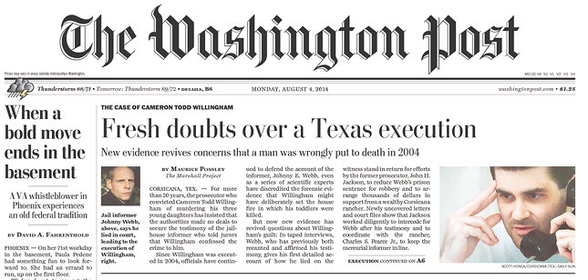The Marshall Project published its first piece Monday, revisiting the story of a 2004 Texas execution that The New Yorker had seemingly nailed down in a 16,000-word tour de force five years ago. Still, the Bill Keller-led criminal justice nonprofit managed to break new ground, landing interviews with a key witness and casting more doubt on a case that could become, as advocates argue, the only proven instance of wrongful execution in the nation’s modern era of capital punishment.
Some questions have swirled about how much the Marshall Project would tilt toward a ProPublica-style big investigations model, versus a more digitally driven journalistic effort. The weighty narrative took to the gates first.
Keller, a former executive editor of The New York Times who joined the startup as its editor in chief, said in a phone interview that the piece “is more of a sneak preview than a debut.” And it couldn’t hold till the site’s full rollout, which he said he expects by mid-October, for fear of competition.
The months-long investigation published Monday tells the story of Johnny Webb, a witness in the triple-homicide prosecution of Cameron Todd Willingham in 1992. Webb now claims he gave false testimony in exchange for reduced time behind bars. Written in a straightforward tone by Pulitzer Prize-winner Maurice Possley, the 4,700-word piece was cross-published by The Washington Post and led the front page of its print edition Monday morning.

Driving the day
“This will be one template we’ll follow,” Keller said. “We’d like to do long investigative pieces, deep dives, that we then deliver to the general public in partnership with other news organizations. That ProPublica model has worked quite well for them and we’ve had a lot of people who’ve wanted to partner with us.”
The Marshall Project is backed by journalist-turned-investor Neil Barsky, who also — full disclosure — chairs CJR’s Board of Overseers. It was one of several new media ventures to announce its launch earlier this year, and Keller’s place atop the masthead lent it an air of credibility from the start. The single-issue site will cover the US court and prison systems, institutions facing complex questions amid criticism of mass incarceration, ballooning costs, and racially biased policing.
The site lists a dozen editorial staff, and Keller said he’s in the process of hiring two more reporters and a photo editor to round out the team. Of primary concern now is ironing out remaining kinks on the website. “I’d rather launch a little later and get it right, especially the reader experience, than launch early and have a HealthCare.gov-like situation,” Keller said.
The site will package its own reporting and commentary alongside aggregated criminal justice news in a daily morning email. In addition to investigative stories like the one published Monday, Keller said, coverage will include day-to-day analyses and magazine-style features.
“Some will be a more character-driven narrative, and some of them will explore things that work,” he said. “It won’t all be about failings in the system.”


 Archives:
Archives: